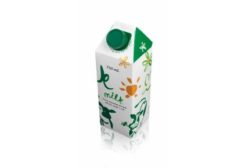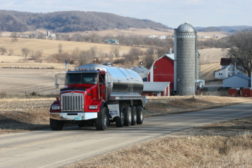Home » Keywords: » sustainable practices in dairy industry
Items Tagged with 'sustainable practices in dairy industry'
ARTICLES
Slimming down
How to create a more sustainable gallon jug for milk
3 ways to a slimmer jug are: light-weighting through container design; adding calcium carbonate as a filler to replace virgin HDPE; and light-weighting plus optimizing for calcium carbonate filler.
December 10, 2013
Alternative energy
Cheesemaker turns waste whey into energy
A Wisconsin cheese producer is utilizing a two-stage digestion process to convert its high-strength waste to biogas while reducing the cost and liability associated with using land application methods to handle its high-strength wastes.
August 1, 2013
Sustainability
Unilever Ice Cream, Ballard Family Dairy & Cheese honored in dairy sustainability awards program
Unilever has reduced electricity use by 13%, natural gas use by 16% and water consumption by more than 1.1 million gallons per year.
April 24, 2013
Carbon footprint
Global recycling of used Tetra Pak cartons increased by 10% in 2012
Tetra Pak packages with bio-based polymer caps derived from sugar cane grew to 610 million in 2012. Nestlé and Coca-Cola are among the first companies to use these packages in South America.
April 3, 2013
Smart trucking
Foremost Farms USA stays competitive with sustainable shipping practices
A company executive says 'we needed to curtail our diesel usage but then came the million-dollar question—how?'
February 25, 2013
Stay ahead of the curve. Unlock a dose of cutting-edge insights.
Receive our premium content directly to your inbox.
SIGN-UP TODAYCopyright ©2025. All Rights Reserved BNP Media.
Design, CMS, Hosting & Web Development :: ePublishing








